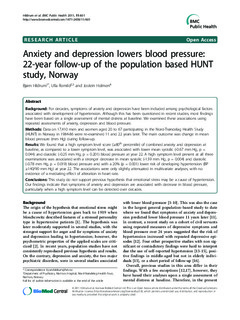Anxiety and depression lowers blood pressure: 22-year follow-up of the population based HUNT study, Norway
Journal article, Peer reviewed
Permanent lenke
http://hdl.handle.net/11250/1240903Utgivelsesdato
2011Metadata
Vis full innførselSamlinger
Sammendrag
Background: For decades, symptoms of anxiety and depression have been included among psychological factors
associated with development of hypertension. Although this has been questioned in recent studies, most findings
have been based on a single assessment of mental distress at baseline. We examined these associations using
repeated assessments of anxiety, depression and blood pressure.
Methods: Data on 17,410 men and women aged 20 to 67 participating in the Nord-Trøndelag Health Study
(HUNT) in Norway in 1984-86 were re-examined 11 and 22 years later. The main outcome was change in mean
blood pressure (mm Hg) during follow-up.
Results: We found that a high symptom level score (≥80th percentile) of combined anxiety and depression at
baseline, as compared to a lower symptom level, was associated with lower mean systolic (-0.67 mm Hg, p =
0.044) and diastolic (-0.25 mm Hg, p = 0.201) blood pressure at year 22. A high symptom level present at all three
examinations was associated with a stronger decrease in mean systolic (-1.59 mm Hg, p = 0.004) and diastolic
(-0.78 mm Hg, p = 0.019) blood pressure and with a 20% (p = 0.001) lower risk of developing hypertension (BP
≥140/90 mm Hg) at year 22. The associations were only slightly attenuated in multivariate analyses, with no
evidence of a mediating effect of alteration in heart rate.
Conclusions: This study do not support previous hypothesis that emotional stress may be a cause of hypertension.
Our findings indicate that symptoms of anxiety and depression are associated with decrease in blood pressure,
particularly when a high symptom level can be detected over decades.
